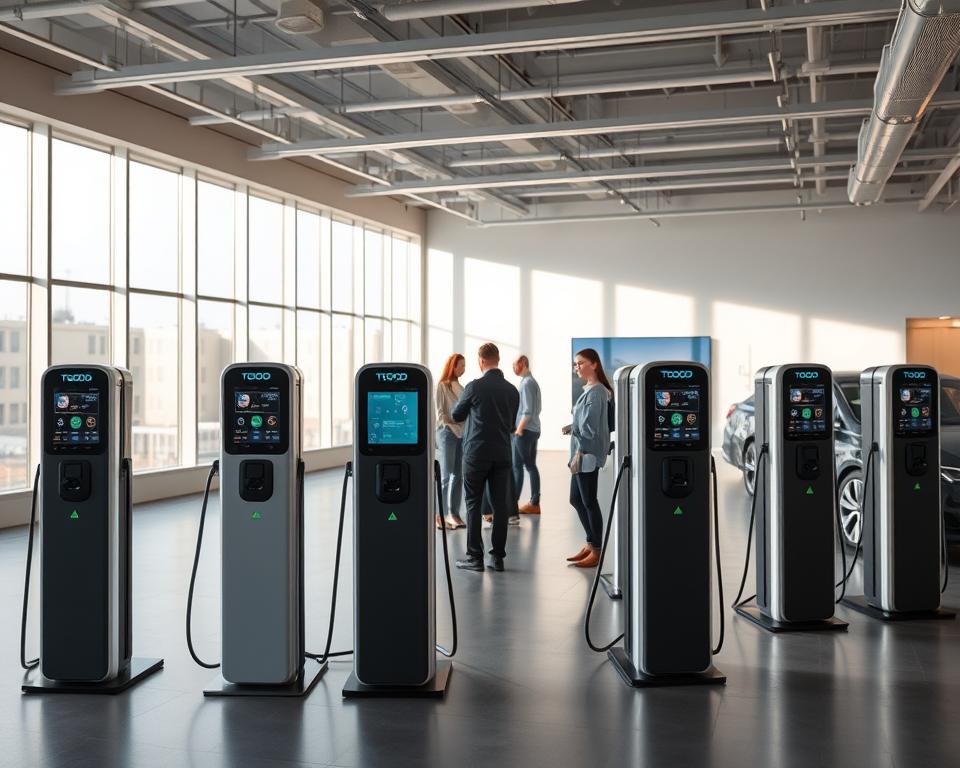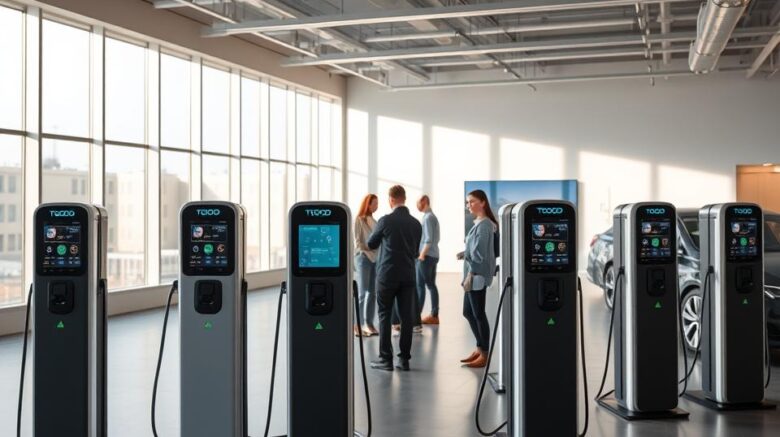Premier EV Charging Cable Manufacturers for Your EV
The electric vehicle industry is on the rise, with the demand for trustworthy and high-performance charging solutions surging. Today, top brands have been at the cutting edge of this change, providing high-quality charging infrastructure. Southwire, for instance, entered the market in 2014 and excels, boasting over 1000 five-star reviews and 75 years of experience in the electrical construction industry.
The upswing in electric vehicle adoption necessitates the need for robust, rapid, and safe Charger Manufacturers in China. Top manufacturers are innovating to meet these evolving needs, offering solutions that improve the overall charging experience.
Grasping the distinctions between various charging solutions is crucial for selecting wisely. Quality charging infrastructure directly impacts vehicle performance and customer satisfaction.
Primary Conclusions
- Top manufacturers offer high-quality charging cables for improved durability and safety.
- EV market expansion drives need for high-efficiency chargers.
- Industry leaders develop cutting-edge products for EV drivers.
- High-grade cables improve energy transfer and driving range.
- Opting for top-tier cables yields future savings.

The Growing Importance of Quality EV Charging Cables
As electric vehicles become increasingly popular, the importance of top-grade EV charging cables cannot be overstated. The performance, security, and dependability of electric vehicle charging systems hinge upon the quality of the charging cables used.
Advancements in EV Charging
Electric vehicle charging technology has undergone significant advancements in recent years, with a shift toward speedy charge times and enhanced protections. Modern EV charging cables are built for these requirements, featuring superior materials and construction techniques to minimize energy waste and maximize transfer rates.
Why Quality Matters in EV Charging Infrastructure
Premium cables enhance both safety and functionality in EV systems. Durable features, such as weather resistance and flexibility in extreme temperatures, ensure reliable operation across various environments. Moreover, regulatory compliance and following protocols are essential in ensuring that cables meet rigorous safety requirements.
| Key Features | Benefits |
|---|---|
| Superior materials and construction | Minimized power loss during energy transfer |
| Robust durability | Weather resistance, flexibility in extreme temperatures |
| Regulatory compliance | Certified safety |
| Serviceability | Long-term value proposition, reduced waste |
Products from Aichie Tech Electronics pass The Cable Lab’s stringent tests. With repairable Portable EV Charger Manufacturer, repairable designs reduce lifetime costs, lowering environmental impact.
Premier Chinese EV Cable Suppliers
China is home to a growing number of EV charging cable manufacturers. They play a key role in global EV infrastructure, providing high-quality automotive cables designed for different applications.
Wottz: Industry Leaders Since 2014
Wottz has been a leading cable manufacturer since 2014. They offer a range of cables that meet the specific requirements of EV charging systems, from Mode 1, 2, 3, and DC Fast Charging (Mode 4).
Aichie Tech Electronics’ 75-Year Legacy
With over 75 years of experience in electrical solutions, Aichie Tech Electronics brings significant expertise to the EV charging cable market. Their products are built for residential and commercial applications.
More Leading EV Cable Brands
Specialists in Type 1/Type 2 connectors and environmental-resistant cables are emerging players. These include Type 1 & 2 connector experts, as well as brands innovating in cable durability and adaptability.
Understanding Different Types of EV Charging Cables
As electric vehicles become increasingly popular, understanding the various types of EV Charging Cable Manufacturers is crucial for optimal charging experiences. Knowing cable types ensures you pick the right charger. The variety in EV charging infrastructure necessitates a closer look at the cable options.
Type 1 vs Type 2 Explained
SAE J1772 (Type 1) and Mennekes (Type 2) are the main global standards. Type 1, also known as SAE J1772, is predominantly used in North America, while Type 2, or Mennekes, is the European norm. The right cable matches your car and charger. Type 2 cables often handle greater power, making them ideal for speed.
Level 2 & Fast DC Cables
Level2 charging cables offer faster charging than Level1, using 240V AC power to deliver up to 19.2 kW of power. DC Fast Charging cables, on the other hand, provide rapid charging by converting AC power to DC within the charging station, delivering rapid fill-ups. These cables are key for highway charging, letting EVs charge in minutes.
Portable vs Fixed Cables
Portable EV charging cables, such as “Granny chargers,” offer flexibility by allowing owners to charge their vehicles from standard household outlets. Tethered cables are fixed to charging stations, offering ease at the cost of portability. The choice depends on the owner’s charging needs and preferences.
Cable length, power rating, and connector type matter most. For instance, portable charging cables range from basic Level1 emergency chargers to more robust Level2 solutions. Vehicle-to-load (V2L) cables represent an emerging category, enabling EVs to power external devices.
- Flexible granny chargers and L2 units suit various needs.
- Fixed cables add convenience, removing cable management tasks.
- Lengths vary from 5 m to 50 m—choose wisely.
Key Features of High-Quality EV Charging Cables
High-quality EV charging cables are distinguished by several key features that ensure reliable and safe charging. These features are crucial for maintaining the integrity of the charging process and safeguarding the vehicle and user.
Robustness and Weatherproofing
Durability and weather resistance are paramount in EV charging cables. Manufacturers like Wottz and Southwire craft their cables from recyclable materials that adhere to ROHS compliance, ensuring they perform in harsh climates. Their serviceable design facilitates easy maintenance and promotes recycling.
Flexibility and Ease of Use
Cables need to flex yet remain tough. High-quality EV charging cables are designed to be flexible, making them easier to handle and maneuver. This flexibility does not compromise their durability, as they are built to withstand regular use.
Certified Safety and Standards
Approved safety marks ensure reliable performance. They ensure their products meet or exceed standards such as IEC62196 for connectors and UL2594 in North America. Independent labs verify safety, toughness, and weatherproofing.
| Certification | Description | Region |
|---|---|---|
| IEC62196 | Connector safety standards | International |
| UL2594 | Standard for electric vehicle supply equipment | North America |
| ROHS | Restriction of hazardous substances | International |
Emphasizing these attributes yields cables that are safe, durable, and user-friendly.
Next-Gen Charging Cable Tech
The latest developments in EV charging cable technology are revolutionizing the way we charge our vehicles, with a focus on ultra-fast charging, reliable data transfer, and sustainable compounds.
Thermal-Managed Fast Charging
Cooling fluids enable higher charge rates, enabling electric vehicles to charge at significantly higher speeds without overheating.
Signal-Boosting Contact Designs
Hyperboloid contacts are being integrated into EV charging cables to enhance signal integrity, ensuring stable communication and power flow.
Eco-Friendly Cable Compounds
Companies focus on green materials, minimizing ecological footprint with RoHS-compliant, serviceable builds. For instance, companies like Aichie Tech Electronics and Wottz are embracing repairable designs and strict standards to foster reuse.
The industry’s shift towards sustainability includes the use of TPU jackets, avoidance of hazardous substances, and the development of take-back programs for end-of-life disassembly and material recovery.
Buyer’s Guide to EV Charging Cables
Choosing the right EV charging cable is crucial for efficient and safe charging. To make an informed decision, consider several key factors.
Compatibility with Your Electric Vehicle Model
Verify your car’s inlet and cable plug match. Your vehicle’s onboard charger capacity determines the maximum AC charging rate it can accept.
Picking the Right Cable Length
Select a cord length based on parking and outlet location. A longer cable adds reach at the cost of extra weight.
Power Rating & Charge Rate
Match your cable’s power handling to your vehicle’s capabilities. Standard Level 2 home charging operates at 7.2 kW, but some vehicles support up to 19.2 kW with appropriate electrical service.
Mind these points to pick a cable that fits your EV lifestyle.
Conclusion: Investing in Quality EV Charging Infrastructure
As the electric vehicle market continues to expand, the importance of quality charging infrastructure cannot be overstated. Choosing cables from Wottz or Aichie Tech Electronics provides long-term value and reliability. Their serviceable designs enable repairs over replacements to cut waste. This approach supports eco-friendly EV use.
Selecting top-grade infrastructure prepares you for next-gen charging.
